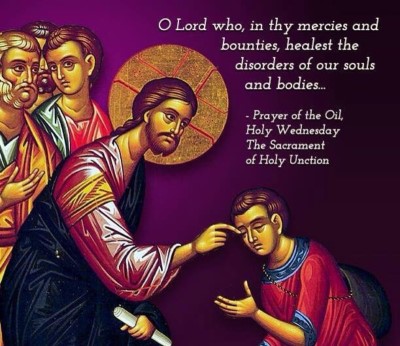Holy Unction
In accordance with the teachings of the Orthodox Christian Church, our spiritual and physical illnesses are usually interconnected and interrelated. When we transgress the laws of morality the feelings of guilt, anxiety, fear, apprehension, worry, anger, etc. may cause physical illness. Many times illnesses brought on by this may also bring about emotional disorders, even despair, which trouble one's faith and trust in God. Thus, it is necessary that one confront these conditions through spiritual means of grace which awaken the need of the ill person to seek repentance and regain spiritual peace with God and oneself.
 As a result of this renewed feeling of wholeness and forgiveness the malady is either cured, in a spiritual aspect, through the sacramental effect of grace and, in its physical aspect, through the use of the physical means of the medical sciences. Should the illness remain uncured, there develops the awareness of patience, trust, hope, and love for God, to be led to a peaceful end to the earthly life.
As a result of this renewed feeling of wholeness and forgiveness the malady is either cured, in a spiritual aspect, through the sacramental effect of grace and, in its physical aspect, through the use of the physical means of the medical sciences. Should the illness remain uncured, there develops the awareness of patience, trust, hope, and love for God, to be led to a peaceful end to the earthly life.
It is for this reason that the Sacrament of Holy Unction is celebrated. Yearly, on Wednesday of Holy Week, everyone in the parish in good ecclesiastical standing may be anointed with the Holy Oil for the healing of spiritual and bodily ills. This Holy Sacrament may also be celebrated any time of the year in case of serious illness by calling the priest (See James 5:13-15).
The Sacrament of Holy Unction is not intended to spare anyone from death but to lead to physical healing which depends on the all-wisdom and love of God; i.e. on His judgment as to whether the healing from illness and the postponement of the time of death, or the passing to the heavenly life, is to the best interest of the faithful.
In the latter part of the 8th century St. Theophylactos wrote: "This Holy Oil is very beneficial for those in travail; it brings about illumination and tranquillity; it signifies the mercy of God and the grace of the Holy Spirit, through which we are relieved of all burdens and receive spiritual joy and tranquillity." As this is one of the seven sacraments of the Orthodox Church, it may be administered only to Orthodox Christians - same criteria as for Holy Communion.